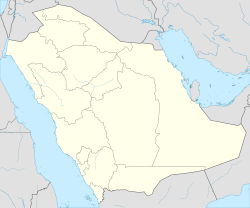Al-Masjid al-Nabawi
| The Prophet's Mosque | |
|---|---|
| المسجد النبوي | |
 |
|
| Basic information | |
| Location | Medina, Hejaz, Saudi Arabia |
| Geographic coordinates | 24°28′06″N 39°36′39″E / 24.468333°N 39.610833°ECoordinates: 24°28′06″N 39°36′39″E / 24.468333°N 39.610833°E |
| Affiliation | Islam |
| Administration | Saudi Arabian government |
| Leadership |
Imam(s):
|
| Architectural description | |
| Architectural type | Mosque |
| Architectural style | Classical and contemporary Islamic; Ottoman; Mamluk revivalist |
| Date established | c. 622 |
| Specifications | |
| Capacity | 600,000 (increased to 1,000,000 during the Hajj period) |
| Minaret(s) | 10 |
| Minaret height | 105 meters (344 ft) |
Al-Masjid an-Nabawī (Arabic: المسجد النبوي; Prophet's Mosque) is a mosque established and originally built by the Islamic prophet Muhammad, situated in the city of Medina in Saudi Arabia. Al-Masjid an-Nabawi was the third mosque built in the history of Islam and is now one of the largest mosques in the world. It is the second-holiest site in Islam, after Masjid al-Haram in Mecca. It is always open, regardless of date or time.
The site was originally adjacent to Muhammad's house; he settled there after his Hijra (emigration) to Medina in 622 CE. He shared in the heavy work of construction. The original mosque was an open-air building. The mosque served as a community center, a court, and a religious school. There was a raised platform for the people who taught the Quran. Subsequent Islamic rulers greatly expanded and decorated it. In 1909, it became the first place in the Arabian Peninsula to be provided with electrical lights. The mosque is under the control of the Custodian of the Two Holy Mosques. The mosque is located in what was traditionally the center of Medina, with many hotels and old markets nearby. It is a major pilgrimage site. Many pilgrims who perform the Hajj go on to Medina to visit the mosque due to its connections to the life of Muhammad.
After an expansion during the reign of the Umayyad caliph al-Walid I, it now incorporates the final resting place of Muhammad and the first two Rashidun caliphs Abu Bakr and Umar. One of the most notable features of the site is the Green Dome in the south-east corner of the mosque, originally Aisha's house, where the tomb of Muhammad is located. In 1279, a wooden cupola was built over the tomb which was later rebuilt and renovated multiple times in late 15th century and once in 1817. The current dome was added in 1818 by the Ottoman sultan Mahmud II, and it was first painted green in 1837, hence becoming known as the "Green Dome".
...
Wikipedia

